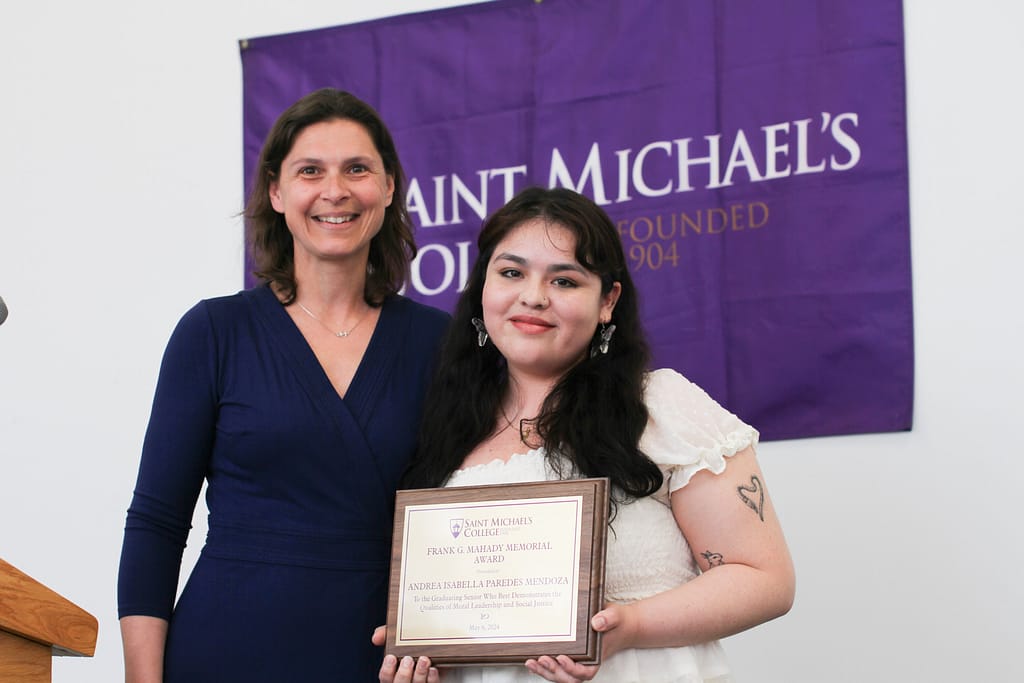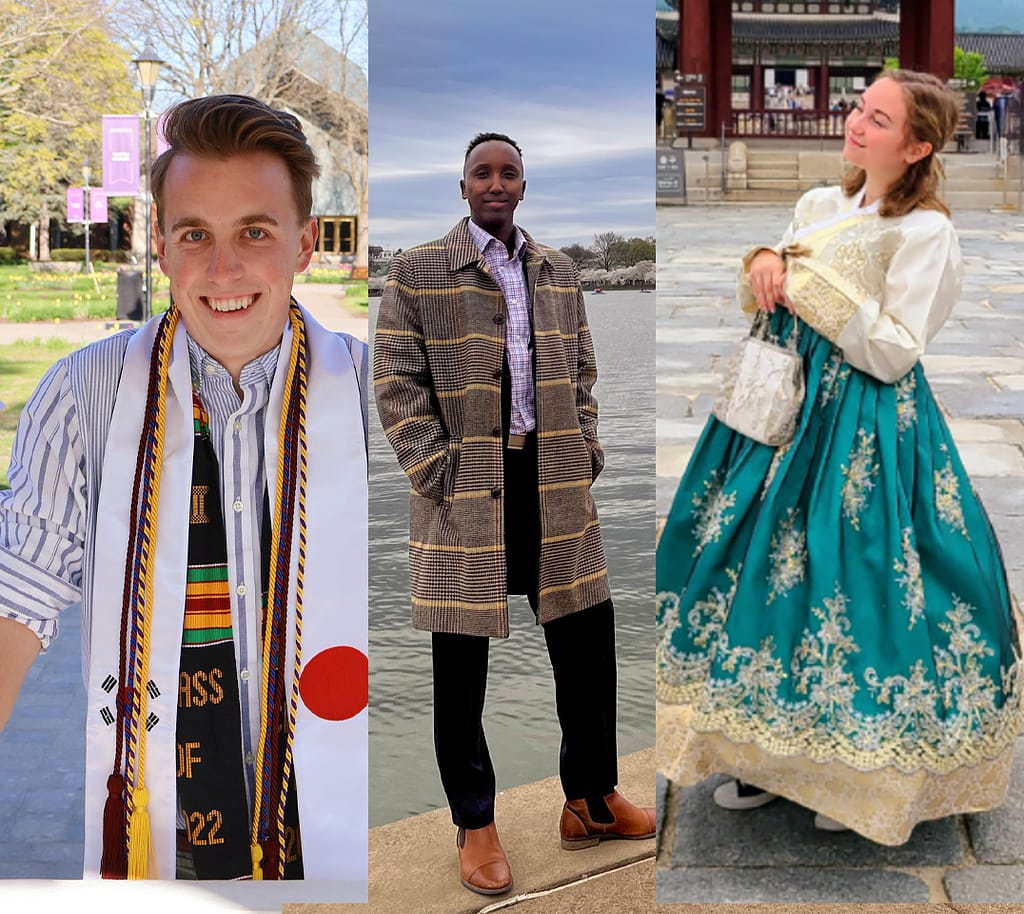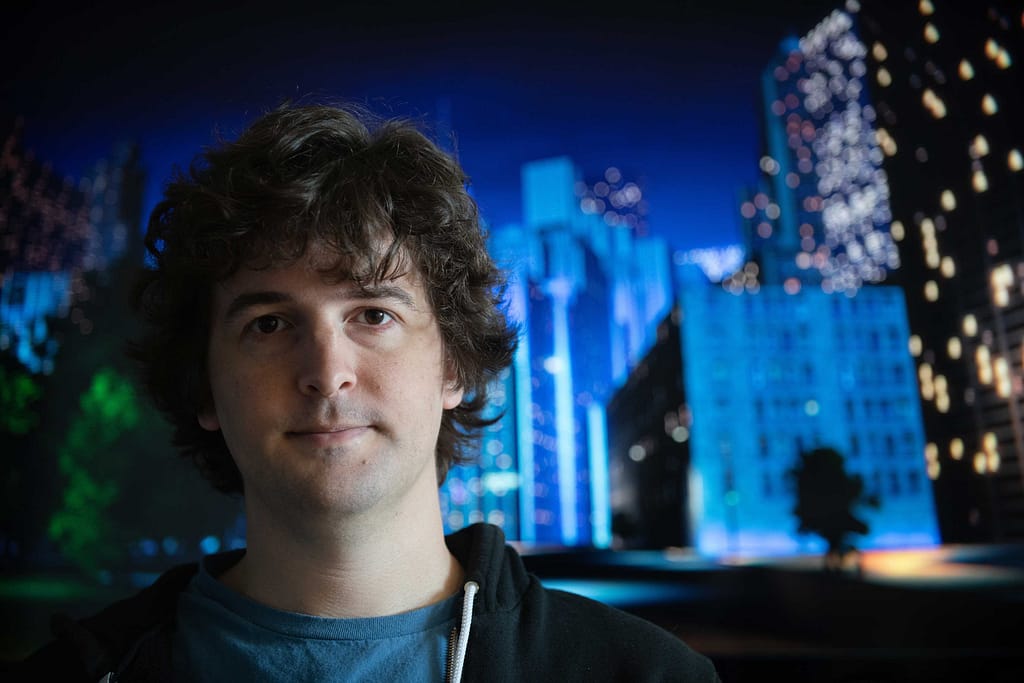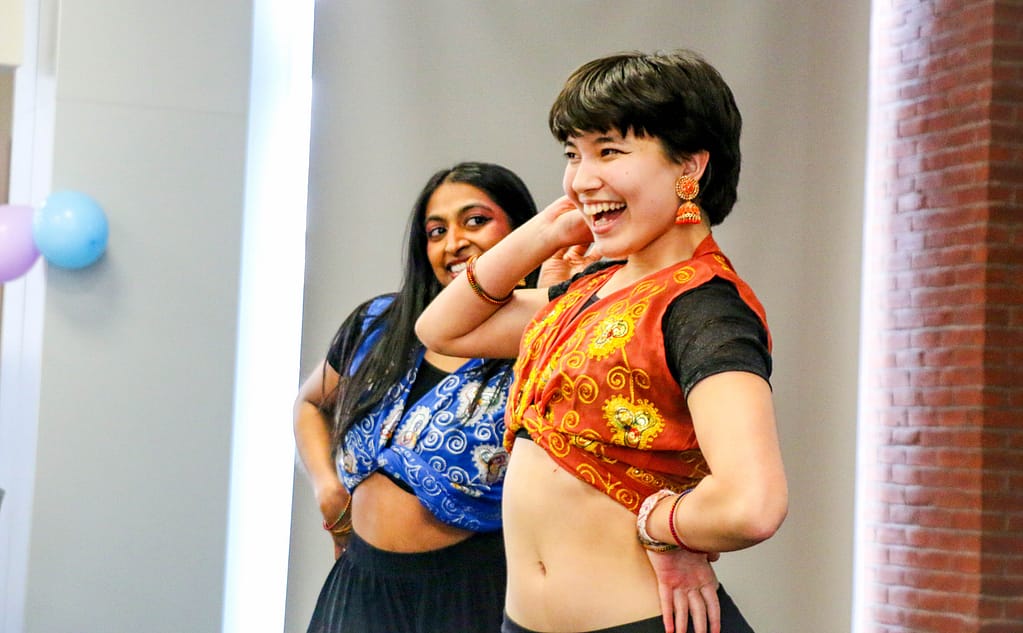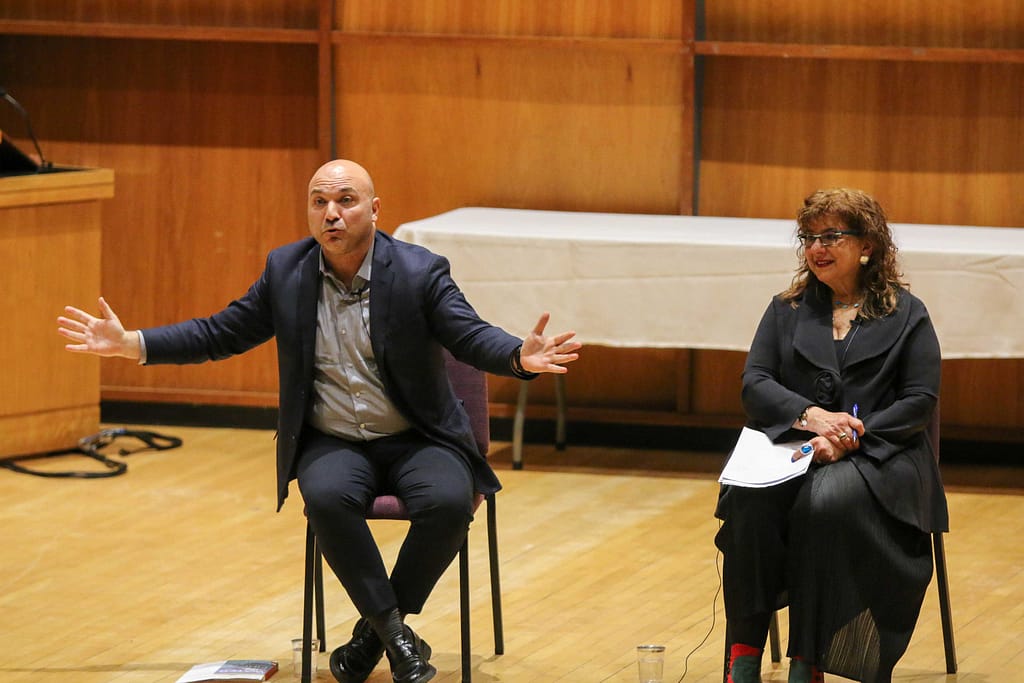Entrepreneurship and the Liberal Arts
Entrepreneur, Merriam-Webster style: “One who organizes, manages, and assumes the risks of a business or enterprise. Go-between. Go-getter.”
According to several sources, the word was first used in the middle of the 18th century, when it appeared in a translation of the King of Prussia’s instructions for his generals (“If the country happens not to abound in forage, you must agree with some Entrepreneur for the quantity required”).
It’s a big word, full of leadership, courage, and creativity, and the people we talked to for this issue were proud to use it to describe their role. How do the liberal arts, and specifically a Saint Michael’s College education, prepare people for that role?
The Business Administration major at Saint Michael’s is different in several ways from programs at other colleges and universities. First, there’s the ethics component. Students entering the major must start with BU 103, Management Ethics. Jobs are for people, and this course emphasizes the importance of managerial decision making, working in teams, and considering stakeholders, not merely shareholders. Second, there is an emphasis on communication, both written and oral. Students must gain the skills they need to translate difficult concepts for lay audiences, educate potential investors, and present their work clearly using evidence and passion. Third, all Business majors must have a minor, in a discipline such as psychology, environmental science, or philosophy.
This gives them the breadth they will need to make decisions that consider multiple perspectives, and to recognize opportunities to fill a need.
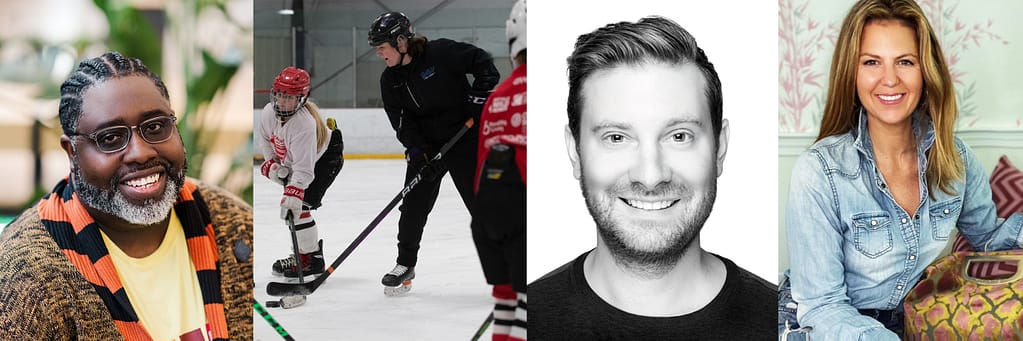
The Fall/Winter Saint Michael’s College Magazine features entrepreneur alums Michael Hill, Jr. ’07, Meghan Sweezey ’10, Jon Stewart ’08, and Catherine McCavanagh ’98 (Photo by Jerry Swope)
GO-BETWEENS
Call it curiosity, opportunity, spotting a need—an ability to envision the future is a core skill that successful entrepreneurs share. As Paul Olsen, associate professor of business administration and accounting, says, “We are preparing students, in many cases, for jobs that don’t yet exist.” Olsen encourages students in his classes to consider themselves entrepreneurs. Often, they are go-betweens, translating the work of innovators for investors. He emphasizes that they must be able to communicate, give successful presentations, and describe what they do and why for people who do not necessarily understand the mechanics of business or the potential of their ideas.
Let’s turn again to Merriam-Webster. The liberal arts, a term coined in the 14th century, had less to do with politics than freedom, unrestricted access to ideas. Entrepreneurs tend to work in uncharted territory—this can mean everything from a new way of teaching farmers sheep-shearing skills to creation of a virtual reality application for first responders and gamers.
The fact that Saint Michael’s College graduates spread out across this spectrum of needs and opportunities is a testament to the skills, flexibility, learning potential, and communication skills the College provides.
GO-GETTERS
The nature of work is changing, and with it, the way we design our lives, prepare to embrace new opportunities,
and navigate failures along the way. The impulse to start a new venture begins with an idea. The idea is born from interest, passion, or creative impulse.
Now comes the hard part. Raising money, managing people, scaling up, experimenting, finding new markets, all of these decision points require skills and an ability to learn—sometimes fast. Let’s look at how a few Saint Michael’s alumni in wildly different arenas have handled the pivots, successes, and failures of entrepreneurship, and how their St. Mike’s education has helped them along the way.
Catherine Hirl McCavanagh ’98
A Journey of Self-Discovery
Catherine McCavanagh’s ’98 company, Cushette, sells eye-catching and colorful handbags, jewelry, hats, sunglasses, and apparel. But it all began with a leopard-print bag.
Actually, it began in high school, with a passion for fashion that carried this entrepreneur on a learning curve to success. Despite the limitations of her Catholic school uniform, she was recognized by her peers for her fashion-forward style.
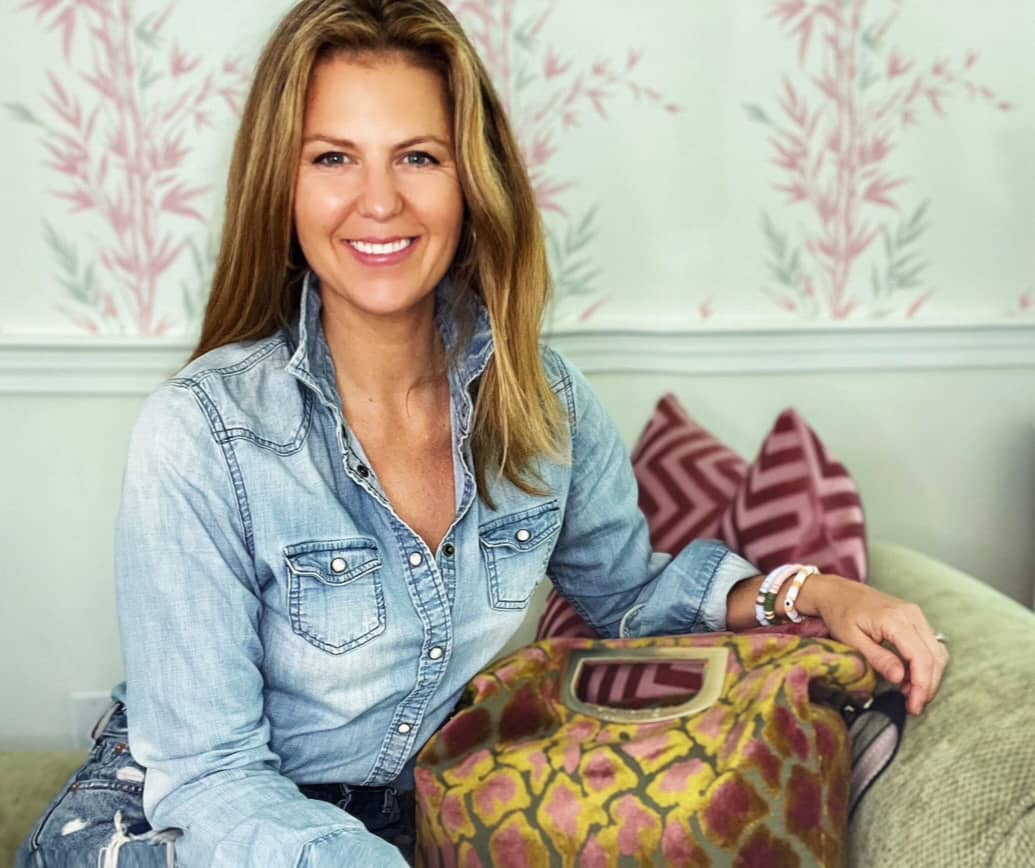
Catherine McCavanagh ’98
McCavanagh came to St. Mike’s from Massachusetts, without knowing anyone else on campus. She was paired with a roommate who was also from Massachusetts, Kerri Shea Burr ’98. Burr remains one of her closest friends. Friends often asked her “what to wear,” even if it was just for a night out at the Blarney Stone Irish Pub in Burlington (RIP).
After graduating, McCavanagh had a series of corporate office jobs but found the work to be unrewarding, and she longed to find a way to express her creativity. It wasn’t until she was in her 30s and living in Hing- ham, Massachusetts, with her young family that she finally felt empowered to follow her heart and start her own business. McCavanagh’s first venture was as a personal shopper and wardrobe stylist. Then, one day, she was flipping through a coffee- table book on celebrities’ homes and noticed a photo that showed a handbag in the corner of Sofia Coppola’s office. Bells went off.
She had to have that bag. But after doing a bit of research and not being able to find it, she realized she’d
have to make it herself. McCavanagh climbed aboard another learning curve. Sourcing luxury fabrics that were vegan and cruelty-free, finding a factory to create samples, learning about marketing, and pricing, and creating the perfect bag from the interior to the exterior were part of her new education. McCavanagh officially debuted her business in April 2021 and named her new line of handbags Cushette, which was a nod to their “cushy” soft fabric.
What’s next? McCavanagh recently opened a consulting business called Forest Advancement. This service guides others who have a product idea but need some assistance bringing it to fruition. Today, the girl who wore a uniform for most of her childhood continues her hunt for self-expression.
Jon Stewart ’08
Zen and the Art of User-Friendly Technology
When Jon Stewart ’08 was an undergraduate at Saint Michael’s he had a few internships, designing and building websites for several clients. Doing this in college as well as for various digital agencies in his professional career, he gained a pretty good idea of the ways traditional marketing technology content management system software could be frustrating, particularly for the non-technical folks among us.
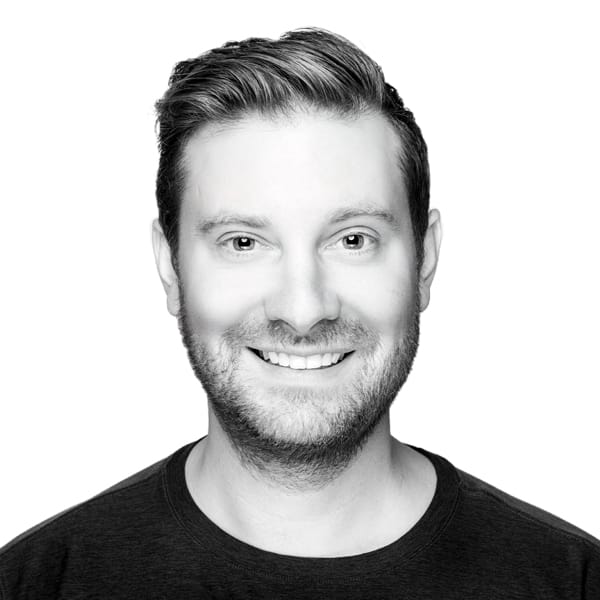
Jon Stewart ’08
Stewart and a few colleagues from his sister company Primacy used Drupal, an open-source Web content management system, to develop what is now ZenSource. It was the result of five-plus years developing a platform to optimize user experience, born, in large part, out of the myriad customer frustrations that Stewart had witnessed, and often solved.
This was not the scrappy grassroots effort traditionally associated with fledgling entrepreneurs. The founders of ZenSource had experience starting companies and rolling out products. Stewart, now the president, says that he and his colleagues built ZenSource in a smart way, largely skirting the risk that can hamper startups. They had a built-in client community. And they were good at listening to their clients to learn what worked and what didn’t.
A Journalism and Mass Communication major at St. Mike’s (the department is now called Digital Media and Communications), Stewart says he “couldn’t even send an email before he got to Saint Michael’s. I was a musician! And then there was the appeal of Vermont, skiing, and rock climbing!”
Within a semester, journalism became his world. And he quickly saw that it could take him in many directions—print, online, Web design, or photojournalism, to name a few. It was hands-on learning, and Professors Jerry Swope and Jon Hyde were instrumental in guiding Stewart through the skills he would later use every day.
Today, ZenSource is growing rapidly alongside its sister companies that are over 100 people strong.
“Tech is constantly changing. You have to adapt. You have to know how to learn,” he says.
Right now, the company is growing across multiple industries and educating clients about the practical near-term uses of AI.
What is the skill that has best served Stewart? “Writing. I write every day, all day long. I can communicate, translate. At its core, my job involves telling stories.”
And what about the work/life balance in this fast-paced world? For Stewart, work and life are pretty well integrated.
“I like to work while the kids are sleeping,” he says, providing an example of the perfect day. “I prefer to graze, do a little work on a Saturday morning.
“Then go rock climbing.”
Meghan Sweezey ’10
Adjust, Adjust, Adjust!
Meghan Sweezey ’10 started Girls 4 Hockey in 2016. The company began as a weekly summer program and has grown into a yearlong model for supporting and training young hockey players.
Sweezey graduated from St. Mike’s in 2010 with a B.A. in English and Psychology. She played varsity women’s ice hockey, serving as assistant captain 2007–09, then captain 2009–10. She earned her M.A. in education at Suffolk University in 2012, before returning to St. Mike’s to work as the assistant director for alumni and family. In 2013, she became the assistant coach for women’s ice hockey, a post she held until 2018. While working as the events manager for the Special Olympics in Burlington, Sweezey began to see a pattern in the way female hockey players were trained.
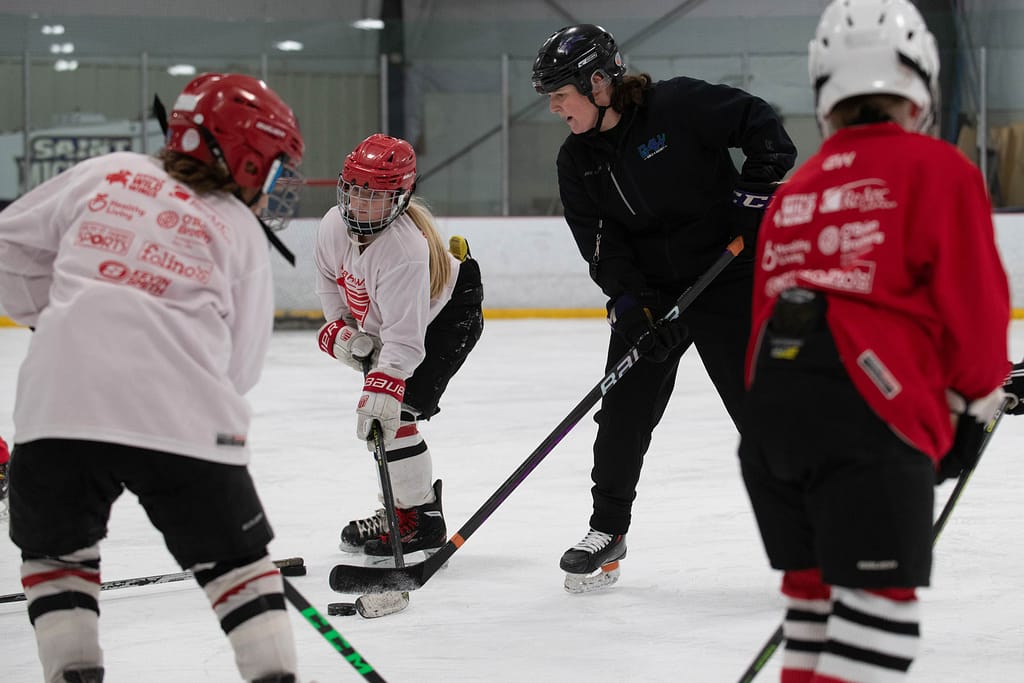
Meghan Sweezey (Photo by Jerry Swope)
“A lot of girls on coed teams were being coached by dads coming to practice from work. They weren’t getting the training and the skills they need. As a female coach on the ice, I had seen how differently girls grew as hockey players,” she explains.
Below a certain age in Vermont, girls have to play on coed teams. And they get overwhelmed. In 2016, Sweezey initially created Girls 4 Hockey for girls age 6 to 14, to give them an opportunity to focus on skills and build their confidence without being intimidated.
Sweezey played boys hockey her junior year in high school. Many college coaches told her she would never play on a college team. “My parents instilled a ‘keep on fighting’ mentality in me,” she says. Saint Michael’s coach Chris Donovan said yes to her.
“Chris always said, ‘adjust, adjust, adjust,’ advice that I use every day as an entrepreneur.”
In 2019, Sweezey partnered with a local organization to include community members in Girls 4 Hockey. In 2020, she took the leap, leaving her job at the Special Olympics to grow Girls 4 Hockey. In 2022, she started several new programs, including a class in learning to skate and play, adult women’s offerings, and weekly camps for specific areas of need, expanding the people served by Girls 4 Hockey. The organization grew to 610 participants. Today, the program is for players ages 3 to adult. Participants travel to Vermont from farther and farther away, and the program is expanding to offer workshops in regions beyond Chittenden County. Girls 4 Hockey is a single-member LLC, with private sessions, weekly sessions, and summer camps. Sweezey recruits players from college teams to coach.
Michael Hill, Jr. ’07
Being an Entrepreneur is a Team Effort
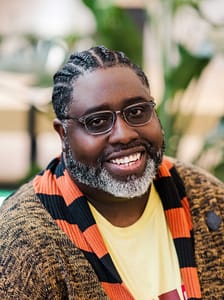
Photo by Jerry Swope
Michael Hill, Jr. ’07 is the founder of EJHFutures, a trauma-informed, responsive equity consulting agency based in Burlington. Hill saw a need to provide training and workshop opportunities for and with educational institutions, school districts, and nonprofit organizations that sought cultural change and community healing opportunities. In an effort to help create youth-empowering environments, specifically for youth of color and QTBIPOC participants, Hill and his community members have worked to strengthen intercultural and racial awareness.
We may picture the entrepreneur as a solitary figure, having ideas and taking risks, but almost always, as Hill points out, entrepreneurs don’t do it on their own. “I was fortunate to have a mentor and a close friend in Rebecca Haslam, assistant professor of education [at Saint Michael’s],” he says. Hill did some consulting work with Haslam, who inspired him to go out on his own to address the many pressing needs in diversity, equity, and inclusion (DEI) work. Other critical influences at St. Mike’s include Lorrie Smith (professor of English, now emerita), Lou Dimasi (student success advisor), and Rev. Brian Cummings (Campus Ministry). Along the path, as he developed his equity consulting business, Haslam, Rhiannon Kim, and Avila Mercedes at UVM were key members of his support crew.
Although the benefits far outweigh the risks, Hill admits that culture- shifting can be risky business. “I’m working with people, handling implicit bias and micro-aggressions, but we must do this work to heal our communities,” he says. The skills he gained as an English major helped him communicate clearly, tell stories, and listen carefully. His minor in Religious Studies gave him the skills to recognize and learn from other perspectives. “I’m working in diverse communities all the time,” he says. “The intercultural awareness I gained helps me make connections and build trust.”
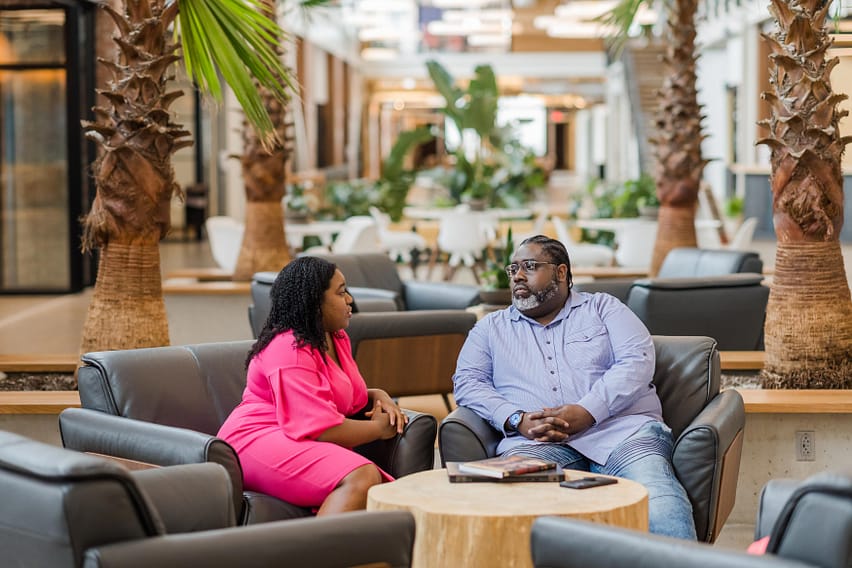
Photo by Jerry Swope
Still, there are times when Hill wonders, “Am I the [right] one to do this work? Am I embodying this work? I try never to get on a judgmental high horse.” This questioning propels him. “I never think I can change people’s views, but I’m also not there for that. My goal is to plant the seeds of reflection.”
Hill got his master’s degree in social work at UVM and is now pursuing his Ed.D. in educational leadership and policy, also at UVM. Is he optimistic about the future of this work? “I self- identify as a realist who leans toward optimism,” he laughs. Changing behaviors is heavy lifting, but Hill does it, in part, for his son, Elin Jackson Hill, whom the company (EJHFutures) is unofficially named after (these are also the names of his parents and mentor). The official name is “Empower to Join together to Heal the Futures,” says Hill. The company, his website declares, “embodies his hope and belief in society.”
Click here to read the entire Fall/Winter 2024 Saint Michael’s College Magazine
